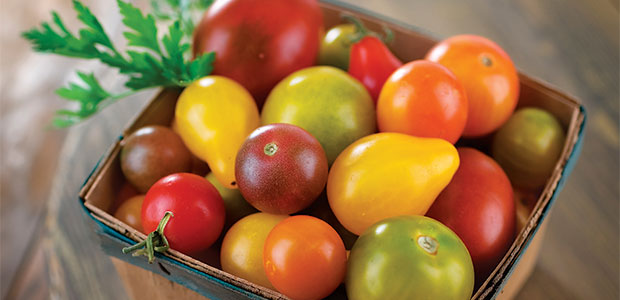Advertisement
Organics Get Organized
Growth, gains, and good food

You have only to look at the salad section at your local grocery to see that organic salad mixes have a solid place in the marketplace—and one destined to grow more leaves if the participants in National Organic Week from September 20 to 28 have their way.
Organic growth
Like organic greens, where reports indicate that sales in BC have reached 39 percent of the market, we’re going to see more organic products taking up key shelf space across Canada in the coming years—meats and poultry in particular—according to Matthew Holmes, executive director of the Canadian Organic Trade Association (COTA).
“Organic food is the fastest growing sector of the Canadian food and agriculture market,” Holmes said in a phone interview. “From 2006 to 2012, the market grew 300 percent. This is in spite of the global recession and the introduction of national standards in Canada. Two major market-dampening events took place and we still tripled in size. That tells you how robust the market is.”
To be precise, that’s $3 billion worth of robustness, supported by a broad consumer base, with more than half of all Canadians buying organic every week, as indicated in a report that COTA released last November on the Canadian organic industry.
As for Canadian Organic Week (see sidebar on page 86), in five years, it too has grown from a grassroots concept to a week-long national celebration of everything organic, from farm to plate.
A personal taste for health
“Personal health, family health,” Holmes said when asked why people choose organic over conventionally grown foods. “There’s a big environmental case for organics, but that comes second for most Canadians. Especially pregnant mothers and new parents … In such a polluted world, there’s only so much we can control, and food choice is one thing we can do to reduce chemical exposure.”
Holmes notes that organic foods have been criticized publically for containing pesticide residues, but that these are largely the residual result of conventional agricultural practices.
“Buying organic doesn’t necessarily mean it’s going to be 100 percent clear of chemicals, but studies show that switching to organic is the number one way to [reduce exposure].”
Compelling research on this point was recently highlighted in Toxin Toxout (Random House Canada, 2013) by Canadian environmental leaders Bruce Lourie and Rick Smith. For one of their original experiments for the book, the pair switched nine children from a conventionally grown diet to an organic diet for four days, then switched them back to a conventional diet for four more days, all the while measuring their urinary levels of certain pesticide residues.
Once the kids went organic, they found that there was a very rapid and congruent drop in urinary pesticide residues. And once they resumed conventional foods, their pesticide residue levels doubled.
“It was chilling,” said Holmes of these results. “Organo-phosophate pesticides are commonly used in agriculture, but it’s nothing anyone wants in their kids … This research tells me two things: A) organics reduce the risk of exposure and B) it’s never too late to make a difference.”
Live, learn, and teach
For holistic nutritionist and culinary artist Eden Elizabeth, a belief in the importance of eating organic combined with healthy meal prep inspired her and a partner to found Feed Life, where they offer courses and workshops on whole food nutrition. All products they use in class are organic.
“It is important to us to show people that you can eat all organic inexpensively when you know how to use up all the produce in your fridge. So much of what people purchase ends up going bad because they just don’t know how to use it all up,” she said in an interview.
Elizabeth’s top reasons to eat organic include reducing the body’s toxin load, which leads to better health and the prevention of disease; avoiding genetically modified foods and ingredients; and—when possible—supporting local farmers and small business.
“Organic agriculture operations lessen the large amount of agrochemical pollution in our environment. Supporting local farms by purchasing their quality produce enhances our food security as a community and encourages the development of other quality operations.”
“Organic just tastes better!” she adds. “If you’ve ever picked a small red strawberry fresh from an organic plant, you know what I mean. It’s juicy, sweet, and satiating.”
To get started, Elizabeth recommends using the Environmental Working Group’s Dirty Dozen and Clean Fifteen lists to decide which foods are best to purchase organically (ewg.org). “They also have a great app so you never have an excuse to be without it,” she said. Frequenting farmers’ markets and choosing local, seasonal foods are also among her other tips.
Growing gains and pains
Organic farmers—or Canada’s relative lack thereof—is also on the mind of Holmes and the Canadian Organic Trade Association. Steady growth in this sector is a good thing but has raised a couple of challenges, infrastructure-wise. “We need more organic farmers,” Holmes adds. “Canada is now the fourth largest market for organic globally.”
And with 98 per cent of Canadian organic shoppers indicating they expect to maintain or increase their spending on organic produce, it’s clear that more supply will be needed to meet the demand.
“I’m not saying that organic farmers have it easier,” says Holmes, “but it’s a growing market. We’re going out there and saying, ‘Why not choose organic? It’s great for soil, great for future generations.’ We’re attracting the future generation of farmers.”
Celebrating National Organic Week
What will you be doing September 20 to 28 for Organic Week? Join what has become a national, week-long celebration of all things organic. Founded five years ago so that the entire sector could come together under one banner, National Organic Week now has opportunities for everyone to get involved.
Last year’s events included everything from canning workshops to organic food and drink tastings. “It’s an exciting time to engage,” says Matthew Holmes. “Lots of companies will launch new products, and it’s perfectly timed with the Canadian harvest.”
“We’re planning to interview and feature some of our local farmers and to offer a free webinar on our website to teach people tips on how to use in-season produce,” says Eden Elizabeth of Feed Life.
Visit organicweek.ca for a clickable map so you can find local events. Those already listed include theatre productions with an organic menu, local farm visits, and recipe contests.
Holmes says the best way to stay on top of what’s going on is to check the website, follow @organicweek on Twitter, and like them on Facebook at facebook.com/organicweek, where they have more than 8,800 followers at time of print.
And of course, one of the best things you can do to celebrate organic is to buy it all year long.





